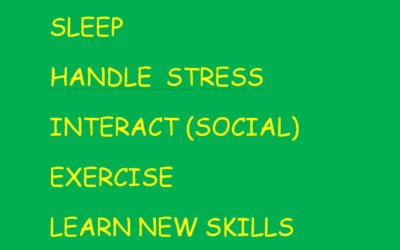Blog & Video Archives
Past Bridge Street Mental Health segment with accompanying text.
Turned Away on Valentine’s Day: Tips for Dealing with Rejection and Loneliness
Depending on your romantic situation, Valentine’s Day can mean dramatically different things. For lovers and married folks, it can be a joyful time to reflect on and express love and affection for one another.
However, this heavily media-hyped day can be an excruciating and heartbreaking time for folks who have lost, are without partners or who are in the midst of relational strife or divorce. Indeed, the plight of those who are lonely can be overlooked and ignored in the wake of the red-hearted deluge of the holiday.
We need to remember that, for these folks, Valentine’s Day is at best awkward and at worst a painful reminder of loneliness, frustration, disappointment and loss.
Beyond the pain of being without or losing a loving partner is the destructive impact on one’s self-esteem . Unfortunately, partner-less and divorcing folks often blame themselves for their lack of romantic success and see themselves as defective or permanently damaged such that they will always be alone.
While some folks do suffer from emotional issues which make sustaining intimate relationships difficult or problematic, that is not the case for most. And for those who are bummed out on Valentine’s Day, here are some thoughts and tips for coping with loneliness until Cupid’s arrows work their magic.
A Valentine’s Day Primer for Couples who want more Romance in their Marriage .
Valentine’s Day is just around the corner and so it’s a perfect time to talk about romance and how important and necessary it is to a lasting and satisfying marriage.
It is ironic that , while that most folks think that romance is a good thing, many married (and unmarried) couples admit that there isn’t a lot of it in their relationship and would like more.
Unfortunately, many erroneously believe that once romance disappears from a marriage, there is no way to get it back. The good news is that there are plenty of ways to rekindle romantic feelings and restore excitement to your marriage. Given the all of the bad information and discouragement surrounding romance, here are some basic facts to remember that explain: 1) Why romance is so important, 2) The key factors that go into keeping romance alive and vigorous and 3) Tips for re-igniting romance and passion that may have flagged :
Let’s Talk about Sexless Marriages: The Good News !
Recent studies have repeatedly shown that Americans are having less sex. One statistic reveals that over half of single folks under forty haven’t had sex in a year. Factors such as work-related anxiety and financial worries leave many singles either too busy or too stressed out to bother with sex.
Shockingly, more and more married couples are reporting that they aren’t having sex either. Sexless marriage hasn’t been talked about much in the past but, lately, it’s attracting more clinical attention because the fact that couples aren’t having sex is emerging more frequently with patients who are seeking help for other issues.
Sadly, many sexless couples don’t seek help because they are discouraged and feel that there is nothing that can be done. Unfortunately, untreated, the problem only becomes worse and worse. While sex may not be the most important thing in life, it’s probably in the top ten. Therefore, couples need to know that sexual problems in marriage, while difficult to talk about at first, are very treatable.
Here are some important facts about sexless marriages:
Being Realistic about New Year’s Resolutions: Some things to think about before making one.
As we come to the end of the year, encouraged by tradition and media hype, many will think about new year’s resolutions and making important changes in their lives.
Likewise, many will look back on the year just past with disappointment and discouragement over the well intentioned but failed efforts from the previous year’s resolution list.
Frankly, change is hard. It takes more than good intentions to actually succeed in making significant and needed improvements in our lives. Many who undertake plans for things like losing weight, quitting smoking or exercising more, for example, fail to understand the necessary factors which are required on one hand and those which work against change on the other.
Taking a little time to reflect may not only improve your chances of succeeding but also help to help you to avoid the pain of not following through. With these complications and pitfalls in mind, here are a some things to think about before undertaking the challenge of a new year’s resolution .
Give the Gift of Empathy During this Holiday Season : Here’s How.
It is tough to be blue during the holidays. Amid the hustle and bustle of the pre – Hanukkah and Christmas hype there are many folks for whom the season is not joyous or bright.
Although many of us look forward to Christmas as a time for gifts and to celebrate family and friends, there are many others for whom the occasion is difficult and even painful. Death , divorce, financial troubles , loneliness , depression and failing health are but a few of the reasons which keep many folks from experiencing the full joy of the holiday.
While we can’t make things all better when we encounter someone who is blue, being aware of his or her plight can help us to be more sensitive and compassionate in our interactions with them. It is important to remember that what folks who are blue really need during this painful time is empathy and understanding. Here are some tips to help you improve your empathy skills and to show more kindness and sensitivity to those you meet :
The Deal : How To Restore Trust After Infidelity.
Infidelity is one of most painful issues married couples ever face. While the emotional wounds created by the break in trust are sometimes too great to repair, I have found that if the offending partner is sincerely repentant, remorseful and willing to work on the individual or relational issues which lead to the problem and, if the offended partner is sincere in his/her desire to reconcile and accepts that most infidelity stems from deeper relational issues which involve both partners, the wound can be healed, trust can be rebuilt and the marriage can actually grow and mature in deeper intimacy.
Over my many years of practice, I have discovered a fundamental communication deal, which, if agreed to and followed by both partners, can , with practice, accelerate healing and renewed confidence in their loyalty and fidelity. However, although the terms of the deal are very simple , carrying out the deal is complicated and difficult. Let me explain.
When Expectations Don’t Work Out.
Expectations. We all have them, that is to say we all have a sense of what is going to happen in our lives. We have routines which we follow and much of our life is predictable. Part of life, however, is unpredictable and folks who naively or uncritically assume outcomes without sufficient reason can be shocked and sadly disappointed.
Indeed, unrealistic expectations or expectations that are not met are a major source of distress in life. The spectrum of disappointment is wide and ranges from trivial things like a sports team losing a game or running into a long line at the bank all the way to a life-crisis event like losing a job or being told that one has a serious disease.
There are lots of events in the middle, however, which, while not serious with a capital S, nonetheless, create inconvenience or worse. Being caught off guard by these kinds of life events is not only frustrating but an situation which can trigger an anger reaction causes us to act out in ways that are socially disruptive and unpleasant for everyone involved. Indeed, being shocked by unexpected happenings is one of the biggest causes of unpleasant outbursts of anger.
Today, we are going to look at how to 1) recognize amygdala-based reactions which often result from unrealistic or unmet expectations, 2) how to calm and reality-test panicked perceptions which generates anger outbursts and 3) how to problem-solve your way to more rational responses to negative and unexpected life events.
Understanding and Coping with “Controlling” People.
Many have commented about the coarsening of our society and the decline of basic civility in politics and in every day life. Psychologically, this change in public decorum correlates with the complexification of life and a greatly reduced sense of control that people experience over there own lives.
Nowhere is the loss of control more painfully experienced than in intimate relationships and marriage. Indeed, one of the most common complaints of couples is that they feel that their partner is too “controlling”. Here are some important facts about our needs for control and some tips for dealing with controlling people:
1) No one has the right to try to control their partner.
2) Attempts to control are signs of anxiety and panic.
3) When in a state of panic, a person is not in touch with their cortex and thus he/she can not think reasonably.
4) It is not helpful or productive to attempt to struggle with someone who is in a panicked state.
5) Only when the experience of anxiety has been lowered can a productive conversation and respectful negotiations to reach mutually agreeable solutions take place .
How Breathing and the “Tupperware” techniques can help to control anger.
Violent and uncontrolled expressions of anger are some of the most threatening emotional, social and cultural issues plaguing our society. One of the especially frustrating aspects of anger is its explosive nature which may erupt without warning.
Although it takes practice, a helpful skill to acquire to control the raw acting out of anger feelings is to delay the urge to immediately discharge the impulse . Using the mental image of a Tupperware container , along with breathing exercises, is an effective way to defer the immediate and unfiltered release of anger impulses and to allow time for a more reasonable response to be made . Here is how they work together to give you more control.
Rethinking the language of mental illness: From nuts and crazy to irrational and disordered.
Recently, a husband in a counseling session turned and asked me to tell his wife that she was crazy. In declining to do so I asked if he could tell me what he was feeling when he made his request. He responded by saying that he felt exasperated. Indeed , sometimes we hurl words like nuts or crazy when we are frustrated and don’t know what else to do. When we feel powerless, name-calling is sometimes the only thing we can think of to do. That’s because cutting remarks about the other person makes them appear smaller and makes us feel better .
Apart from the session, it got me to thinking about how his comment , in addition to being hurtful, is a sign that, despite all that we have learned and despite all the progress that we have made, that we still have a long way to go to get beyond the fear and stigma attached to mental health issues.
Part of the prejudice stems from ignorance and a gross misunderstanding of psychological disorders. This confusion has been and continues to be perpetuated, in part, by the common usage of antiquated and misleading terms such as “crazy” and “nuts”.
Today, let’s explore the linguistic origins these hurtful anachronisms and consider better alternatives to use when discussing mental health issues.
S.H.I.E.L.D. : Six steps to protect your brain from Alzheimer’s Disease
This is Alzheimer’s awareness day and here is an acronym that everyone should learn: S.H.I.E.L.D.
SH.I.E.L.D. stands for the six things that everyone can do to help protect their brain from this dreaded disease.
In the past research was aimed at protein build-up (plaques and tangles) but the latest thinking is that INFLAMATION is the culprit.
Here are six life-style changes that can help reduce inflammation in the brain and better protect you from Alzheimer’s disease.
The Absense of Empathy: Psychology’s Take on the Origin of Sin and Evil.
The incessant reports of gun violence has stimulated deeper questions about the very notion of human sin and evil. A recent report in the New York Times interviewed a theologian and a psychiatrist about their understanding of these mysteries. As one who is an ordained minister and also a licensed psychotherapist, I found the discussion fascinating and relevant to modern concerns about why bad things such as mass shootings happen. Further, the dialog provides a good example of the kinds of issues which pastoral counselors address.
In a recent article in the New York Times a theologian and a psychiatrist were asked about their understanding of evil and sin. Specifically, the psychiatrist expressed the widely held view of how modern brain research and psychology understands the concepts of evil and sin. This evolving bio/psycho/social perspective provides a different slant on traditional religious views of evil but, ultimately, is congruent with the fundamental message of biblical beliefs. Here is a look of how science informs and relates to the theological concept of sin.
First Aid for Anxiety : Part II – Anticipatory Anxiety
A few weeks ago, I wrote about how to employ first-aid for anxiety. In that discussion, the type of anxiety being addressed was the kind which was triggered by a perceived external stressor in the person’s environment, such as a having a difficult conversation with a person or receiving bad or threatening news .
— Today I want to talk about a different kind of anxiety which can also produce intense dysphoric symptoms but which originates in the neo-cortex of the brain and comes from an internal-anticipated threat, rather than an actual or immediate one.
— Rather than relying on physical isolation from the distressing stimulus, a technique which I call Sensational Distraction (SD) can be used to disrupt distract the stressful cascade of thoughts and anxious feelings. With SD a person can shift the focus and attention of their immediate experience from thinking thoughts to perceiving sensations in their body and thus stop the flow of disturbing thoughts and calm the distressed state of mind.
— Although many distractors can be used , an especially effective technique for lessening and stopping anxiety I call the Orange. The orange relies on SD and is the first step, after a person realizes that they are experiencing anticipatory anxiety, calming one’s mind. The technique involves four steps and goes like this:
Political attempts to blame the mentally Ill for mass shootings is wrong.
I know it has been a couple of weeks since the tragedies in El Paso and Dayton. I also know that mass shootings have become so frequent that our ability to really comprehend and feel the horror has been saturated beyond human limitations.
That said, it is important, in addition to not giving up or giving in to emotionally accepting gun violence as a fact of life, that we not fall victim to our fatigue or fall prey to bogus political attempts to offer facile explanations for complex problems. Likewise, we must be careful not to blame an innocent population for inexplicable horrors. You may have heard some politicians suggest that mental illness is the cause of these mass shootings. Frankly, those who do this simply don’t know what they are talking about and are wrong. Here is why:
First Aid for Anxiety
Anxiety is a serious and complex problem for many people. In some cases, successful treatment requires a combination of psychotherapy and medication. For many, however, employing some basic first-aid can render significant and immediate relief.
Here are four steps which, if followed, can quickly and dramatically reduce the crippling effects of panic and anxiety attacks.
2017
- May 31, 2017
Understanding the Parallels between Biblical and Psychological Wisdom - May 14, 2017
Aprreciating the Emotinal Complexity of Mother’s Day - May 02, 2017
Redefining Mental Health: The Struggle to be Reasonable - April 16, 2017
Easter and the Therapeutic Process: The Rest of the Story - April 02, 2017
Judgers and Perceivers - March 19, 2017
Communication Tip # 6 : Understanding the Differences between Thinkers and Feelers - March 04, 2017
Communication tip #5 : Understanding iNtuitive and Sensate Personality Differences - February 21, 2017
Communication Tip # 4: Understanding the differences between Extroverts and Introverts - February 03, 2017
Aristophanes and the Myth of Androgyne: The Soulful Meanings of Love - January 15, 2017
The Myth of “Holding on” to the Past : Neuro-science and the Grieving Process - January 02, 2017
Being Reasonable about New Year’s Resolutions:
2016
- December 17, 2016
New Research offers Hope for Resistant Depression - December 04, 2016
Bursting Some Common Myths About Pastoral Counseling - November 23, 2016
Thanksgiving: A Time for Regaining Perspective and ,for some, Conflict - November 11, 2016
Dealing With Political Grief - November 02, 2016
Explaining the Facebook Study: Turns out Cyber Friends Are Important Too - October 19, 2016
Beyond Romantic Myths: 9 Tips for Getting real about what it takes to have a great marriage - October 03, 2016
Why Mental Health Check-Ups Are a Good Idea - September 15, 2016
Appreciating the Health Benefits of Good Friends - August 31, 2016
When it comes to sex, men are Windows and women are DOS - August 14, 2016
Good News for People Who Worry about Memory Loss - August 05, 2016
The Psychology of Blaming: Learning to See the Fear Behind the Anger - July 07, 2016
Psychological Manipulation: What it is and How to deal with it. - June 21, 2016
Coping with the Absurd and the Horrifying Stories in the News - June 05, 2016
Do you have to be “crazy” to see a therapist ? - May 18, 2016
Sex in Marriage : Are You having Enough ? - May 07, 2016
Updating the Image of Psychotherapist: A Life-Tour Guide - April 29, 2016
Updating the Image of Psychotherapist: From Orthodontist to Helicopter Pilot When people think abo - April 12, 2016
Spring Cleaning for your Marriage - March 28, 2016
Some thoughts about the importance of Hope - March 16, 2016
I-Statements 101: The Keys to Expressing Anger Constructively - March 02, 2016
Understanding Leisure as an Essential Part of Self-Care - February 12, 2016
Romantic Myth # 3: Love is a Special Feeling - February 09, 2016
Romantic Myth #2 : Love Never Ends - February 06, 2016
Bursting Popular Myths about Love - January 25, 2016
How to Make a Worry List: The Importance of Emotional Triage - January 12, 2016
Want More Intimacy In Your Relationship? Try Sharing Your Dreams - January 02, 2016
The Secret to Keeping New Year’s Resolutions
2015
-
- December 21, 2015
Light and the Meaning of the Holidays - December 07, 2015
Dealing with Increased Terror-Related Anxiety - November 20, 2015
Dealing with the stress of Holiday Gatherings - November 10, 2015
Are You An IMpatient Person ? - October 27, 2015
How Exchanging Marital Report Cards Can Improve Your Relationship - October 07, 2015
October is Domestic Violence Awareness Month - September 21, 2015
Understanding the new “Female” Viagra - September 12, 2015
Talking about end of life issues and facing our fears of dying - August 24, 2015
Bursting the Forgiveness Myth - August 13, 2015
Understainding our False Guilt about Sex - August 02, 2015
Do you know your “Organ of Distress”: Recognizing when an emotional fire is about to break out. - July 20, 2015
How to Build Trust After an Affair . - July 05, 2015
The “Emotinal Cigarette” – A breathing exercise to help you relax. - May 18, 2016
Sex in Marriage : Are You having Enough ? - June 24, 2015
Good News for Work Outs - June 15, 2015
Sneaky Depression Triggers - June 03, 2015
Human Sexuality Is More Complicated Than You Think. - May 28, 2015
Mental Health Myth # 4: Talking to friends is the same thing as going to therapy. - May 28, 2015
Myth # 3: Psychological disorders are very rare - May 06, 2015
The Myth of Mental Illness: 2.0 - May 03, 2015
Did you know that May in Mental Health Awareness Month ? - April 25, 2015
Bruce Jenner Interview Outshines Olympic Gold - April 10, 2015
White House Supports Ban on “Conversion Therapy” for Gay and Transgender Youth - April 03, 2015
Sexism in FDA: Continues a Double Standard, Hurts Women - March 16, 2015
Taking Your Emotinal Pulse - March 05, 2015
Your Emotional Docimeter
- December 21, 2015
Rekindling Passion: Part Two – The Secret to Re-igniting the Fames of Desire
-
- January 30, 2015
Rekindling Passion: Part One – The Truth about Aphrodisiacs - January 14, 2015
Emotional Triage and the Worry List - January 06, 2015
A Check-List Before Making Your New Year’s Resolutions
- January 30, 2015
2014
- December 10, 2014
Reducing Stress Around the Holidays - November 23, 2014
Feeling Grattitude When Times Are Hard - November 07, 2014
Reducing Stress for Seniors : Tips for Dealing with Everyday Worries and Finding More Joy in LIfe - October 27, 2014
Five Things You Didn’t Know About Halloween - October 14, 2014
Having Good Sex is a Sign of a Healthy Marriage - September 30, 2014
New “Consent” App Asks Partners Important Questions to Think About Before Having Sex - September 09, 2014
Lame Excuses – Why we make them. How to stop. - August 13, 2014
Robin Williams’ Severe Depression: Keeping Things in Perspective - July 16, 2014
The Quiet Crisis: Adult Children Caring for Aging Parents - June 18, 2014
Clearing up the confusion about Transgendered People and Gender Non-Conformity: Getting the medical - May 21, 2014
Getting Rid of Grudges: Just let it go – or maybe not. - April 16, 2014
Finding Romance among the Diapers - March 26, 2014
Bursting the “Hard Work” Myth”: The Importance of Leisure - February 12, 2014
Wedding Insurance and Pre-Marital Counseling :Bursting the Obligation Myth. - January 15, 2014
Submissiveness and Leadershipin the Modern Marriage
2013
- December 23, 2013
Reducing Stress Around the Holidays – A Pastoral Counseling Approach - December 18, 2013
Balancing Career and Family - November 19, 2013
Dating Younger: How the internet and social media have expanded dating choices for single people - October 30, 2013
Five Things You Didn’t Know About Halloween - October 09, 2013
Are You Bing Bullied in the Workplace ? - September 04, 2013
Are You Addicted to the Internet ? - August 14, 2013
Post-Partum Depression: What every expectant or new mom needs to know. - July 31, 2013
Secrets of Assertiveness 101: - July 08, 2013
Sex Education for Adults: Cheating - June 17, 2013
PTSD Awareness - June 05, 2013
Leaving the Nest – Vaulable Tips for Parents and Young Adults - May 22, 2013
Five Mental Health Myths - May 08, 2013
A Spring Cleaning for Your Marriage: Personal Appearance - April 17, 2013
Dealing with the Boston Marathon Bombings? - March 28, 2013
“Breaking up” with your Hairdresser - March 13, 2013
Is This ( am I ) Normal - February 27, 2013
Romantic Second Chances: When should I give him (her) another chance? - February 13, 2013
Caring and Consideration: The Keys to Lasting Passion - January 17, 2013
Emotional First Aid: Tips for Responding to Everyday Psychological Distress - January 02, 2013
New Year’s Resolutions: Why We Brake Them, How To Keep The,
2012
-
- December 19, 2012
Take Controle of your Holiday Stress - December 03, 2012
Life Smarts and The Intelligence Myths
- December 19, 2012
- October 30, 2012
Here’s the Skinny on Scary: The Facts about Phobias - October 19, 2012
Oh, I Remember it well … or maybe not ! - September 26, 2012
The Importance of Remembering - September 05, 2012
Going Back to School Chaos: Help for Parents - August 17, 2012
Money Conflicts and Marriage: Tips for Keeping the Peace - July 30, 2012
Using Your Imagination to Overcome Procrastination - July 23, 2012
UPreventing Tragic Story Overload in the Wake of the Colorado Massacre - July 09, 2012
Redefining Normal: An Inclusive Way of Understanding Mental Health - June 27, 2012
PTSD National Awareness Day : Myths and Facts - June 20, 2012
Reducing Stress When You Travel - May 30, 2012
How to Cope with an Unreasonable Boss - May 16, 2012
How to Disagree without Being Disagreeable - May 14, 2012
Myths and facts about happiness: What really makes us happy ? - April 25, 2012
Body Language: Our Emotional Traffic Lights - April 04, 2012
The Importance of Work Place Colleagues - March 14, 2012
Stress and Relationships - February 29, 2012
Is It Love or Chemistry ? Tips for knowing when real love comes along. - February 13, 2012
Can Love and Romance Last ? Yes, But It Takes Work ! - January 18, 2012
Why am I so Impatient ? Tips for Dealing with the New Technologies that are Driving us Crazy./a> - January 04, 2012
The Psychology of Successful Weight Loss — Tips for Avoiding the Emotional Pitfalls which Sabotage
2011
- December 23, 2011
Are You Emotionally Out of Shape ? Here’s a Check List to Help You Become Emotinally Fit - December 07, 2011
Don’t be So Defensive – Tips for Dealing with Criticism Gracefully - November 23, 2011
Feeling Gratitude in the Wake of Hard Times - November 08, 2011
The Truth about Secrets and Itimacy in Marriage - October 26, 2011
How to Have A Constructive Argument - October 12, 2011
The Psychological Cigarette – Understanding the Breathing/Relaxation Connection - October 03, 2011
Am I OCD or just really particular ? - September 12, 2011
The 411 about Marriage Counseling – What it Can and Can’t do. - August 09, 2011
Psychology and Smart Phones: The Risks of Overusing your PocketPC - August 01, 2011
The Art of Compromise: Keys to Successful Marital Negotiation - July 20, 2011
Planning your wedding ? Don’t forget your relationship: the Essentials - July 05, 2011
Creating 2nd Chances: Tips for Turning a Bad Situation into a Good One - June 08, 2011
The Seven Year Itch: Why it Happens and How to Prevent i - May 25, 2011
Fair Fighting – Some Ground Rules for Resolving Marital Conflicts - May 11, 2011
Unnecessary Criticism: Why we do it ; How to stop it - April 27, 2011
Money Conflicts in Marriage: It’s not just about the Money - April 13, 2011
Spring Cleaning Your Marriage: Personal Appearance - April 01, 2011
Understanding and Coping with Jealousy in Marriage - March 16, 2011
Therapeutic Self-Talk: What it is, Why it’s Helpful and How it Works . - March 09, 2011
Breaking the Ice After an Argument: Understanding the Psychology of Post Argument Silences - February 23, 2011
Guilt-Tripping and Emotional Manipulation No one likes to be guilt-tripped, yet it happens all - February 14, 2011
The Secret of Keeping Romance Alive: Tips for Busy Couples - January 26, 2011
Sibling Relationships 101:Tips for Updating your Sib Status - January 19, 2011
How Words Can Help Us to Heal The tragedies of the Tucson shooting has created many emotional wounds - January 14, 2011
A Myth About Mourning Although most of the country was moved by the ceremony held for the victims - January 06, 2011
Boosting Your Brain: Sorting out the Facts from the Myths
2010
- December 29, 2010
End of Year Marital Review and Marital Resolutions for the New Year - July 19, 2010
Pouting - June 28, 2010
Are You Just Discouraged or Really Depressed ? How to Tell the Difference - May 25, 2010
Emotional False Alarms - May 06, 2010
The Science of Making Up - April 12, 2010
Spring Cleaning for your Marriage
2009
- December 07, 2009
Marital Make-Overs for the Holidays: Tips for Fallling in Love All over Again - November 02, 2009
Marriage Is Hard - October 05, 2009
Keeping Your Cool - September 10, 2009
Nagging: Why we do It , How to Stop - July 23, 2009
Understanding Affairs - June 30, 2009
Interviewing Successfully - June 01, 2009
Helping our Parents with Difficult Decisions - March 09, 2009
The Good News About Stress - February 19, 2009
Talking to Teens about Sex
















